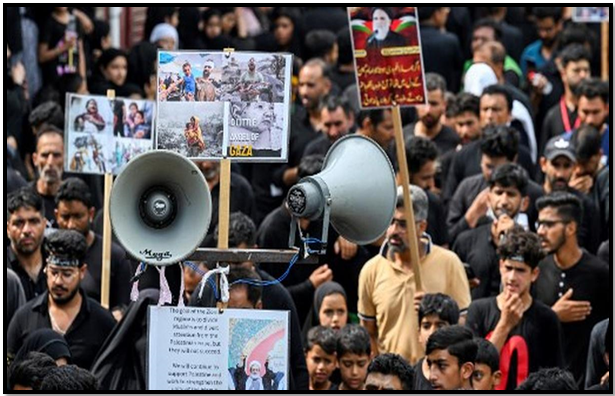UAPA CASE BOOKED FOR PRO-PALESTINE SLOGANS IN J&K: A COMPREHENSIVE ANALYSIS
Relevance:
GS 2 – Government Policies and Interventions for Development in various sectors and issues arising out of their design and implementation.
Why in the News?
- A case under the Unlawful Activities (Prevention) Act (UAPA)
was filed by the Jammu & Kashmir Police against Shia mourners who allegedly raised pro-Palestine and anti-Israel slogans during a Muharram procession in Srinagar.
- This action has been criticized by several regional leaders and has initiated debates on the application of such stringent laws.
Current Scenario
- During a Muharram procession in Srinagar, participants were observed carrying Palestine flags and chanting slogans.
- The police have registered a case under Sections of the UAPA against unidentified individuals who participated in the 8th Muharram procession at Lal Chowk.
Legal Context: UAPA
- UAPA Overview: Enacted in 1967, the Unlawful Activities (Prevention) Act is designed to prevent unlawful activities and associations in India.
- Provisions: The Act allows for the designation of individuals and groups as terrorists and empowers authorities to address activities that threaten India’s sovereignty and integrity.
- Recent Amendments: The latest amendments in 2019 expanded the Act’s scope, enabling the government to designate individuals as terrorists.
Comparison with TADA and POTA
- TADA (Terrorist and Disruptive Activities (Prevention) Act): Enacted in 1985, TADA was India’s first anti-terrorism law but was repealed in 1995 due to concerns over misuse and human rights violations.
-
- Provisions: It allowed for the detention of individuals without formal charges for up to 180 days and reversed the burden of proof.
- Criticism: The Act faced severe criticism for its harsh provisions and widespread allegations of misuse against minorities and political opponents.
- POTA (Prevention of Terrorism Act): Enacted in 2002 following the 2001 Parliament attacks, POTA was another stringent anti-terrorism law but was repealed in 2004.
-
- Provisions: Similar to TADA, it included provisions for detention without charge, special courts, and enhanced surveillance powers.
- Criticism: POTA faced criticism similar to TADA, with reports of misuse and human rights violations leading to its repeal.
State-Level Acts in Maharashtra and Gujarat
- Maharashtra Control of Organised Crime Act (MCOCA): Enacted in 1999, MCOCA targets organized crime and terrorism in Maharashtra.
-
- Provisions: It allows for the interception of wire, electronic, or oral communication and has provisions for extended detention periods.
- Criticism: Critics argue that MCOCA’s stringent provisions can be misused for political purposes and to target specific communities.
- Gujarat Control of Terrorism and Organised Crime (GCTOC) Act: Enacted in 2019, GCTOC is similar to MCOCA but with additional provisions.
-
- Provisions: It includes provisions for extended detention without charge, admissibility of intercepted communications as evidence, and stringent bail conditions.
- Criticism: Like other anti-terror laws, GCTOC has faced criticism for potential misuse and lack of safeguards against human rights violations.
Implications of the UAPA Case in J&K
- Security Concerns: The use of UAPA reflects the state’s approach to maintaining security and preventing activities perceived as threatening.
- Human Rights Issues: The invocation of UAPA has raised concerns about potential human rights violations and the suppression of free speech and dissent.
- Political Repercussions: Such cases often lead to political debates about balancing national security and individual freedoms.
Conclusion
The registration of a UAPA case for pro-Palestine slogans in J&K highlights broader issues surrounding the use of anti-terror laws in India. While these laws are crucial for national security, their stringent provisions and potential for misuse necessitate a careful and balanced approach to ensure that fundamental rights are not compromised.
Mains Question
Discuss the significance of anti-terrorism laws like UAPA, TADA, and POTA in India. What measures can be taken to prevent their misuse while ensuring national security? (250 words)
Source:The Hindu




